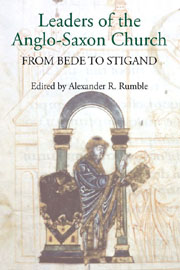Book contents
- Frontmatter
- Contents
- List of Illustrations
- Preface
- Contributors
- Abbreviations
- Introduction: Church Leadership and the Anglo-Saxons
- 1 Bede and the Early English Church
- 2 Archbishop Ecgberht and his Dialogus
- 3 Abbatial Responsibility as Spiritual Labour: Suckling from the Male Breast
- 4 Understanding the Earliest Bishops of Worcester c. 660–860
- 5 The Role of Bishops in Anglo-Saxon Succession Struggles, 955 × 978
- 6 Image-Making: Portraits of Anglo-Saxon Church Leaders
- 7 ‘To Keep Silence Following the Rule's Command’: Bishop Æthelwold, Reforming Ideology and Communication by Signs
- 8 Wulfsige of Sherborne's Reforming Text
- 9 From Winchester to Canterbury: Ælfheah and Stigand – Bishops, Archbishops and Victims
- Index
3 - Abbatial Responsibility as Spiritual Labour: Suckling from the Male Breast
Published online by Cambridge University Press: 05 February 2013
- Frontmatter
- Contents
- List of Illustrations
- Preface
- Contributors
- Abbreviations
- Introduction: Church Leadership and the Anglo-Saxons
- 1 Bede and the Early English Church
- 2 Archbishop Ecgberht and his Dialogus
- 3 Abbatial Responsibility as Spiritual Labour: Suckling from the Male Breast
- 4 Understanding the Earliest Bishops of Worcester c. 660–860
- 5 The Role of Bishops in Anglo-Saxon Succession Struggles, 955 × 978
- 6 Image-Making: Portraits of Anglo-Saxon Church Leaders
- 7 ‘To Keep Silence Following the Rule's Command’: Bishop Æthelwold, Reforming Ideology and Communication by Signs
- 8 Wulfsige of Sherborne's Reforming Text
- 9 From Winchester to Canterbury: Ælfheah and Stigand – Bishops, Archbishops and Victims
- Index
Summary
ANGLO-SAXON church leaders contributed widely to the scholarship, government, art and architecture of the Anglo-Saxon church. However, their immediate influence was most keenly felt within their own monastic communities, and impacted largely on the spiritual family of monks and/or nuns in their care. These church leaders were removed from the experiences and realities of lay domesticity and often from biological family ties. At least as they are represented in extant texts, they transferred this experience into the spiritual realm, nurturing the spiritual development and Christian integrity of the men and women in their community, as parents would their offspring. Whilst these leaders did not physically create and give birth to their progeny, it was their labour which inspired in their children the creation and growth of Christian faith. I will here focus on three texts which employ the language of motherhood in portrayals of three different church leaders, Æthelthryth, Leoba and Wilfrid. I will examine how and perhaps why, through the use of this lexis and imagery, the individual contributions of these leaders to the development and recognition of their monastery and their influence on the monks and nuns beneath them, was manipulated by the authors.
- Type
- Chapter
- Information
- Leaders of the Anglo-Saxon ChurchFrom Bede to Stigand, pp. 61 - 76Publisher: Boydell & BrewerPrint publication year: 2012



